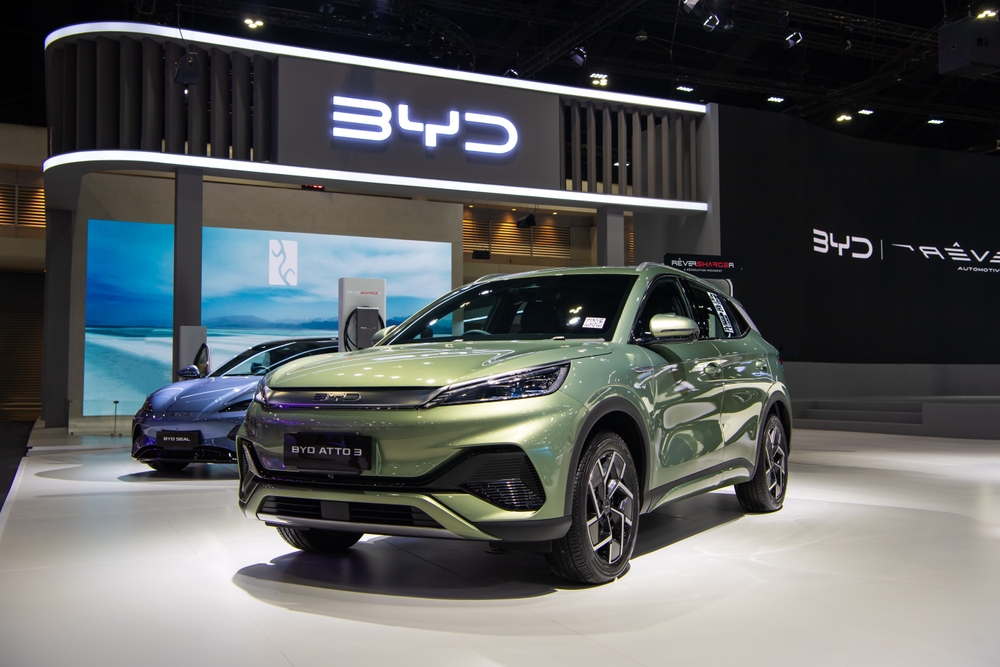Copyright © Everyday Narrative 2024. All rights reserved.
The global electric vehicle (EV) market has been witnessing a seismic shift in its competitive landscape, primarily driven by technological advancements, changing consumer preferences, and rigorous environmental policies. For a long time, Tesla Inc. has been synonymous with electric vehicles, leading the charge in revolutionizing the automotive industry with its innovative battery technology and stylish electric cars. However, recent developments have introduced a new leader in the race for EV dominance – BYD Company Limited, a Chinese multinational firm that has recently overtaken Tesla to become the biggest producer of battery-powered cars. This significant milestone marks a pivotal moment in the electric vehicle industry, highlighting the rapidly changing dynamics and the increasing competition among manufacturers.

BYD, short for Build Your Dreams, has been a significant player in the electric vehicle market for several years, but its recent surge to the top is a testament to the company’s dedication to innovation, sustainability, and strategic market expansion. Unlike Tesla, which primarily focuses on the passenger vehicle segment, BYD has a diverse product lineup that includes not only passenger cars but also buses, trucks, and monorails, broadening its reach and impact on the global shift towards cleaner transportation solutions.
The ascent of BYD is reflective of a broader trend in the EV market, where Chinese manufacturers are increasingly gaining ground. China, being the largest market for electric vehicles, has been a fertile ground for local manufacturers to innovate and expand. The Chinese government’s aggressive policies to reduce carbon emissions, including substantial subsidies for electric vehicles and strict quotas for manufacturers, have significantly propelled the growth of the EV industry within the country. As a result, Chinese EV manufacturers like NIO, XPeng, and Li Auto are also making notable strides on the global stage, challenging established players and reshaping the industry landscape.
Tesla, on the other hand, has been facing a series of challenges despite its pioneering role in the electric vehicle revolution. Supply chain disruptions, production delays, and increasing competition from both traditional automotive giants venturing into the EV space and emerging startups have put pressure on Tesla’s market position. However, Tesla continues to innovate, with plans to expand its product range, enhance its battery technology, and increase production capacity. The company’s recent expansions into new markets and the construction of Gigafactories around the world are part of its strategy to maintain its competitive edge and meet the growing global demand for electric vehicles.
The competition between BYD and Tesla is emblematic of the broader race for supremacy in the electric vehicle market. This rivalry is not merely about sales numbers but encompasses a battle of technologies, strategies, and visions for the future of transportation. Both companies are at the forefront of battery technology innovation, with BYD’s Blade Battery and Tesla’s advancements in battery density and efficiency representing significant milestones in making electric vehicles more accessible, reliable, and sustainable.
Moreover, the rise of BYD and the intensifying competition in the EV market underscore the importance of sustainable practices and innovation in addressing climate change. Electric vehicles are a crucial component of the global effort to reduce carbon emissions and combat global warming. The success of companies like BYD and Tesla in pushing the boundaries of what is possible in electric transportation not only provides consumers with more choices but also drives the entire automotive industry towards a more sustainable future.
We take a look at the 10 biggest EV manufacturers, starting with the biggest in terms of production numbers.
1. BYD (Build Your Dreams)
BYD stands as a powerhouse in the electric vehicle (EV) industry, originating from China. Established in 1995 as a rechargeable battery company, it has since evolved into a global leader in the production of electric cars, buses, and trucks. Known for its significant investment in battery technology, including the innovative Blade Battery, BYD has expanded its footprint globally. The company’s commitment to sustainability and vertical integration strategy, encompassing battery production through to vehicle assembly, positions it as a formidable Tesla competitor. BYD’s diverse product range caters to both consumer and commercial markets, highlighting its ambition to lead in the transition to cleaner transportation.
2. Tesla
Founded in 2003 by a group including Elon Musk, Tesla has revolutionized the automotive industry with its focus on electric vehicles, energy storage, and solar panel manufacturing. Known for its high-performance electric cars, Tesla has pushed the boundaries of EV technology, autonomy, and sustainability. With a mission to accelerate the world’s transition to sustainable energy, Tesla’s innovative approaches, including its Supercharger network and over-the-air software updates, have set new industry standards. Despite challenges, Tesla’s brand remains synonymous with electric vehicles, underlining its ongoing influence and leadership in the sector.
3. Volkswagen Group
The Volkswagen Group, a German multinational automotive manufacturing company, has made significant strides in the electric vehicle market with its ambitious “TOGETHER – Strategy 2025” plan, aiming to become a global leader in e-mobility. Its extensive portfolio of electric vehicles across multiple brands, including Volkswagen, Audi, Porsche, and Skoda, showcases its commitment to sustainability and innovation. The Group’s massive investment in electric technology, infrastructure, and battery production underscores its dedication to transitioning away from fossil fuels and leading in the electrification of the automotive industry.
4. General Motors (GM)
An American multinational corporation, GM has embraced the electric vehicle revolution with its vision of a future with zero crashes, zero emissions, and zero congestion. Through the introduction of the Ultium battery platform, GM plans to launch a broad array of electric vehicles across its brands, including Chevrolet, Cadillac, and GMC. GM’s commitment is highlighted by its bold pledge to phase out gasoline and diesel vehicles by 2035, underscoring its significant role in driving the automotive industry toward sustainability.
5. Hyundai
The Hyundai Motor Company, a South Korean multinational automaker, has rapidly expanded its presence in the electric vehicle market with its Ioniq brand and a commitment to launching numerous EV models by 2025. Hyundai’s approach combines innovative design with advanced technology, such as its E-GMP platform, to offer competitive electric vehicles that appeal to a global audience. With investments in hydrogen fuel cell technology alongside its EV offerings, Hyundai is positioning itself as a versatile player in the future of green transportation.
6. Stellantis
Formed from the merger of Fiat Chrysler Automobiles and the PSA Group, Stellantis is a global automotive company with an ambitious roadmap for electrification. With a plan to offer electric versions across its comprehensive portfolio of brands, including Peugeot, Fiat, Jeep, and Maserati, Stellantis aims to become a major player in the EV market. Its strategy focuses on leveraging the strengths of its legacy brands while embracing innovation and sustainability to meet the evolving demands of consumers and regulations.
7. GAC Group
Guangzhou Automobile Group Co., Ltd. (GAC Group) is a Chinese state-owned automotive manufacturer that has made significant inroads into the electric vehicle segment through its GAC Aion brand. Specializing in producing eco-friendly and technologically advanced electric vehicles, GAC is dedicated to innovation in EV technology, including fast charging and extended range capabilities. The company’s focus on the domestic Chinese market and expanding international presence underscore its ambitions in the global EV arena.
8. Geely Auto Group
Geely Auto Group, part of the larger Zhejiang Geely Holding Group, is a prominent Chinese multinational automotive company that has embraced electrification across its portfolio. With brands such as Volvo Cars, Polestar, and Lynk & Co., Geely is advancing in the EV market through significant investments in electric technology and sustainable mobility solutions. Geely’s vision encompasses a future of connected, electric, and autonomous vehicles, positioning it as a forward-thinking player in the automotive industry’s shift towards greener alternatives.
9. Renault–Nissan–Mitsubishi Alliance
The Renault–Nissan–Mitsubishi Alliance represents a strategic partnership between three major automotive manufacturers. With a combined focus on innovation and sustainability, the Alliance is a leader in electric vehicle production, thanks to models like the Nissan Leaf and the Renault Zoe. Their collaborative efforts aim to leverage synergies in research, development, and production to drive down costs and accelerate the adoption of electric vehicles worldwide, demonstrating a commitment to leading the global transition to sustainable mobility.
10. Chery Automobile
Chery Automobile Co., Ltd., a Chinese state-owned automobile manufacturer, has been expanding its footprint in the electric vehicle market through its New Energy brand. Known for its affordable and practical electric vehicles, Chery is dedicated to making sustainable transportation accessible to a broader audience. With a focus on innovation in EV technology and international expansion, Chery aims to play a significant role in the global shift towards cleaner, more sustainable modes of transport.



